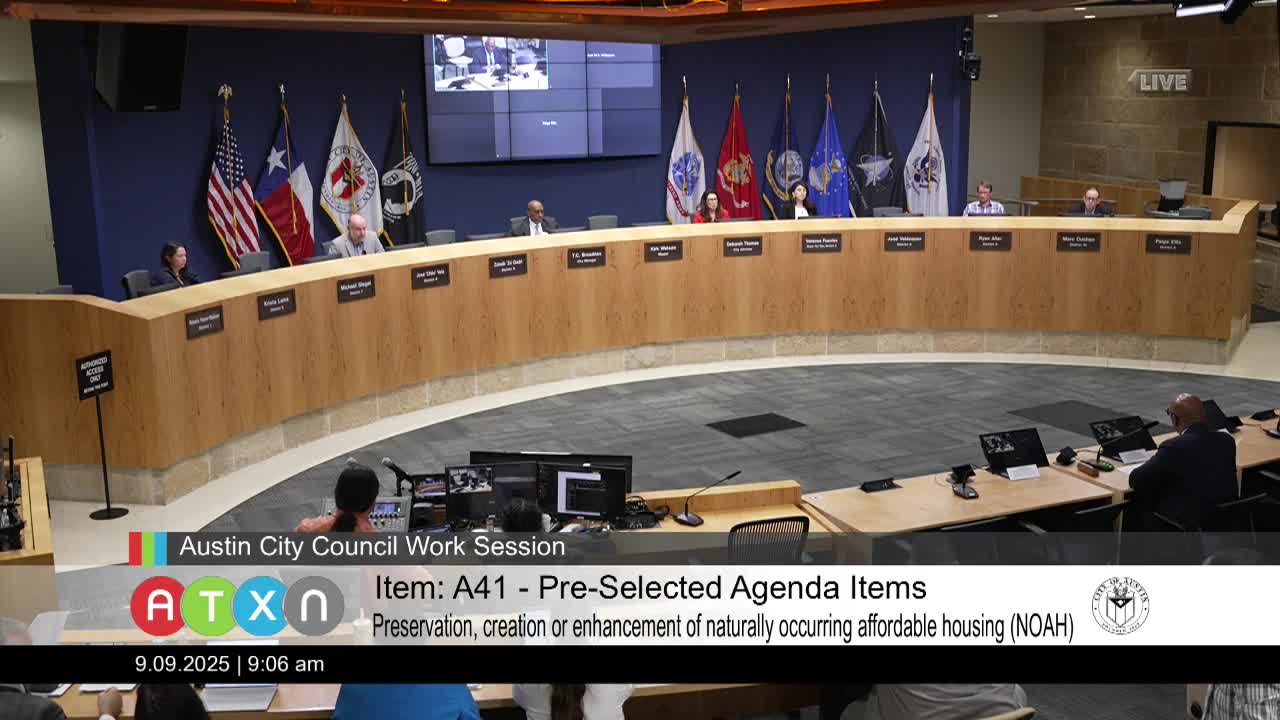CoStar Analyzes Austin's NOAH Properties Amid Redevelopment Concerns
September 09, 2025 | Austin, Travis County, Texas
This article was created by AI summarizing key points discussed. AI makes mistakes, so for full details and context, please refer to the video of the full meeting. Please report any errors so we can fix them. Report an error »

During a recent Austin City Council Work Session, discussions highlighted the pressing issue of Naturally Occurring Affordable Housing (NOAH) in the city. With approximately 28,375 lower-income housing units across 789 buildings, the need for affordable housing is becoming increasingly critical for residents.
The average income for individuals living in these lower properties is around $73,000, which represents 52% of the local population aged between 40 and 55 years. Notably, only 19% of this income is allocated to rent, averaging about $13.95 per month. However, projections indicate a concerning trend: by 2030, nearly 5,000 of these units could face demolition, with an estimated 100 units lost each year.
The discussion pointed to several factors driving this potential loss. Since 2016, NOAH properties have been classified as investment-grade by CoStar, making them attractive for acquisition rather than new construction. This has led to a situation where it is often cheaper to purchase existing NOAH properties, renovate them, and increase rents significantly. Current forecasts suggest that rent growth could exceed $1,800 per month, creating a financial strain on residents.
The council emphasized the importance of understanding the two categories of NOAH properties: those in areas ripe for redevelopment and those that are not. The former often face obsolescence, making them prime targets for acquisition and redevelopment, while the latter may remain stable but still require attention to maintain affordability.
As the city grapples with these challenges, the discussions underscored the urgent need for strategies to preserve affordable housing and support the community's diverse population. The outcomes of these discussions will play a crucial role in shaping Austin's housing landscape in the coming years.
The average income for individuals living in these lower properties is around $73,000, which represents 52% of the local population aged between 40 and 55 years. Notably, only 19% of this income is allocated to rent, averaging about $13.95 per month. However, projections indicate a concerning trend: by 2030, nearly 5,000 of these units could face demolition, with an estimated 100 units lost each year.
The discussion pointed to several factors driving this potential loss. Since 2016, NOAH properties have been classified as investment-grade by CoStar, making them attractive for acquisition rather than new construction. This has led to a situation where it is often cheaper to purchase existing NOAH properties, renovate them, and increase rents significantly. Current forecasts suggest that rent growth could exceed $1,800 per month, creating a financial strain on residents.
The council emphasized the importance of understanding the two categories of NOAH properties: those in areas ripe for redevelopment and those that are not. The former often face obsolescence, making them prime targets for acquisition and redevelopment, while the latter may remain stable but still require attention to maintain affordability.
As the city grapples with these challenges, the discussions underscored the urgent need for strategies to preserve affordable housing and support the community's diverse population. The outcomes of these discussions will play a crucial role in shaping Austin's housing landscape in the coming years.
View full meeting
This article is based on a recent meeting—watch the full video and explore the complete transcript for deeper insights into the discussion.
View full meeting
